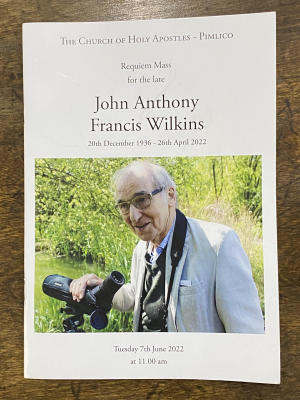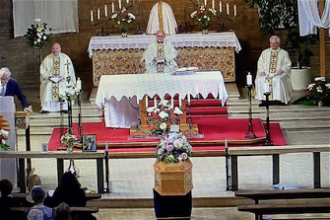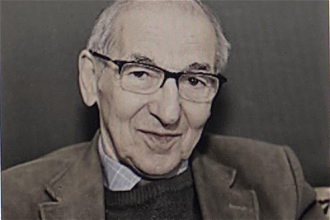Text: Canon Pat Browne at Requiem Mass for John Wilkins

Canon Pat Browne gave the following homily today at the Requiem Mass for John Wilkins, former editor of the Tablet, at The Church of Holy Apostles, Pimlico, who died on 26th April.
When he moved into Pimlico, the lady who looked after the house where he lived exclaimed: "Ah, I see we are getting a better class of person now!" After all, he had been to Cambridge, worked for the BBC and when he was about 20 he was an officer in the British Army. He had also been a boxing champion while in the services!
His arrival in Pimlico did not immediately connect him to this church. That only happened when he retired from being Editor of the Tablet. No longer having to spend Sundays catching Mass in Pottery Lane and swiftly back to the office to prepare the weekly edition for its deadlines, he discovered us just down the street from his flat.
When he retired he found us. He now had more time and availability to throw himself into being just one of the foot-soldiers here. An ordinary parishioner. Every Sunday for the 10.30 family Mass John sat just over there amid the hustle and bustle of young families, noisy babies, singing along, always encouraging the choir, the families, the young people as they approached exams or went for another job. He took great delight during Covid lockdown along with about 180 others from all over the country in discussing on Zoom, Austen's and Pope Francis's book 'Let us Dream' and more recently during Lent just gone by, he was part of a house group discussing the findings of our parish questionnaire on Synodality and their implications. Many of the answers we got to that questionnaire were not what was expected but were no surprise to John. They only affirmed what he had always thought. He was doing Synodality through his work as a journalist long before the rest of us had even started using the word. He was a serving member of the parish pastoral council right up to the time he went into hospital.
John was a convert. It hadn't pleased his mother who remarked to a friend, "If I had brought John up properly, this would never have happened!" However, he owed his deep faith particularly to his mother who he told me was "naturally religious" and brought John up in the high end of the Anglican Church, having moved herself from being a congregationalist. His religious upbringing was strong on Bible Reading, with an emphasis on being moral and thrifty. He loved the Anglican Church. So why did he leave it?
He told me "there was a hole as I read the Anglican writers of the day like Honest to God John Robinson". The other hole was the Eucharist. In Anglicanism you are taken up in the Eucharist he told me. In Roman Catholicism the Mass comes down to you. It is very tangible and you can touch it like this table here". These experiences, along with Pope Paul V1 bringing the Second Vatican Council to a close and the hope it held out, led John to convert in 1965.
John often talked about his family, his brother Brian who died some years ago and his sister Angela who is here with us this morning with his two nieces Louise and Sarah. While they certainly didn't live in each other's pockets and had very different lives, they were very important to John. They were his roots.
17 years ago John asked me if I would come round to his flat for a cup of coffee. Having heated the milk in that famous battered saucepan of his, he wanted to discuss his funeral, and asked me if I would officiate at it. I began to ask him about himself. I don't think he was expecting that - after all, he was the one usually conducting the interview - but slowly and very shyly he began to open up.
We talked about his story, his conversion and falling in Love.
John had two great loves. One was the Tablet. "I always wanted to be Editor of the Tablet," he told me "I cannot think of what an alternative would have been." He was editor for 21 years.
But there was another great love in his life. They became close friends and had deep conversations. Eventually he came clean and declared his love for her, which led to a long relationship. She died in 1987.
He followed up our meeting over coffee that morning with a letter in which he told me "She is the love of my life. And a light for me all my days. There never was, before or since, anyone else. I hope that in the Resurrection she and I will be together once more and go on like that, never to be parted again. We shall both of us have to trust God to sort it all out. He alone can write straight with crooked lines." I love her - present tense.
John was a loyal son of the church but not its slave, as one of his friends has written. As editor of the Tablet he often put Bishops' noses out of joint. But this was never malicious - perhaps a bit mischievous as only John could be, looking at you over his glasses with those pursed lips and a wry, even challenging smile - but never malicious.
A church that does not want to hear the voice of those who question and even sometimes dissent is like a government that would seek to silence concerned whistle blowers. Such an institution would become a cosy nest for a comfortable elite and not listening, deprive itself of growing in grace and truth. John would not have wanted that for a church he had grown to love.
Just last August I was around again to the flat on one of my now fairly frequent visits for a coffee and John told me he was trying to get the latest book on Wittgenstein.
Then in the next breath, he asked me "Do you know who Bruce Dickenson is?" No I answered, I don't. He was the leader of IRON Maiden the heavy metal band, John told me. In 1994 the Bosnian War was raging. The capital Sarajevo was a complete and utter war zone. Buildings were burning. Bombs were dropping and amidst all this madness Dickenson who was then touring as a solo artist took his band at the time, Skunkworks through the madness of it all to perform. A film was made of this called SCREAM FOR ME and John was fascinated by it. He had watched it as much as 12 times.
Such is the man we are remembering today, who had one foot in the world of ideas but had the other one firmly planted in the world of people, their troubles, sorrows and joys and thus was a most interesting and at the same time faithful, kind and compassionate friend to have.
John asked that we have at his funeral the scripture from St Paul to the Romans which Annabel read today. It had come to his attention at a Mass on All Souls Day and it captured for him the promise of the Lord.
Hope is not deceptive. When we were reconciled to God by the death of his Son, we were still enemies; now that we have been reconciled, surely we may count on being saved by the life of his Son?
John had that confident trust in God's faithfulness to us, even amid, what he called the madness of his last weeks in hospital. When I gave him Holy Communion, anointed him and prayed with him in those days, you could see how deeply touched he was by this encounter with Christ in the Eucharist and prayer.
Now we pray that the promises made to him in the scriptures be fulfilled.
May he be united with those he most longed to see again in the Resurrection.
May he rest in peace and rise in glory!
Watch a recording of the Mass here: www.holyapostlespimlico.org/index.php/live/ (Click on 'Recordings and scroll down to 'Funeral Mass for John Wilkins (RIP) 11:00 07-06-2022')

















